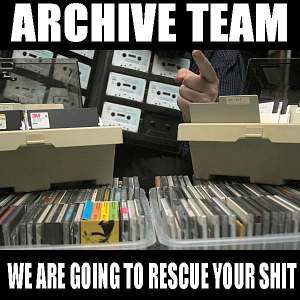In the realm of digital history, one of the most challenging issues is that of preservation. What, in the mass of online information, should we be saving? How much can we realistically save? Who should do the saving? Well, Archive Team has one solution.
Archive Team is a loose collective of rogue archivists, programmers, writers and loudmouths dedicated to saving our digital heritage. Since 2009 this variant force of nature has caught wind of shutdowns, shutoffs, mergers, and plain old deletions – and done our best to save the history before it’s lost forever. Along the way, we’ve gotten attention, resistance, press and discussion, but most importantly, we’ve gotten the message out: IT DOESN’T HAVE TO BE THIS WAY.
Certainly, this is a noble effort. Companies create websites which are then used and shared by people around the world, but when the company is ready to drop the ball, where does that leave the users? Archive Team not only keeps their ears to the ground to be prepared for any upcoming potential loss of digital heritage, but also gives everyday people the tools they need to participate in this effort, and to save that which is important to them. In my previous post about digital preservation, I mentioned that collaboration was going to be key to this effort; not just between institution and institution, but also between institutions and indivisuals. Archive Team is another avenue in which individuals can participate in preserving our online heritage and digital memory.
But are there ethical and legal issues arising from this kind of rogue archiving? I don’t believe so. Archive Team is only saving that which is at risk of disappearing altogether. They are not stepping on any toes by taking money out of the pockets of these companies who are the original creators of that site. Here you can see a really great article from MIT Technology Review about Archive Team in which Scott explains that he and the Archive Team do not seek permission before undertaking one of their raids, though as a rule they only go after files that are publicly available, and Scott says most sites do not complain. There has been a TON of media coverage about the work that Archive Team is unedrtaking, and many have lauded them as heros of digital preservation. However some problems have inevitably arisen. One example is explained by Jason Scott, Archive Team’s creator, in this video called, “That Awesome Time I Was Sued for Two Billion Dollars.” If you want to hear more from Archive Team’s creator, this video shows Jason Scott explaining how and why he does this work.



